|
|
|
Sort Order |
|
|
|
Items / Page
|
|
|
|
|
|
|
| Srl | Item |
| 1 |
ID:
158958
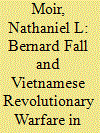

|
|
|
|
|
| Summary/Abstract |
This article assesses Bernard Fall’s concept of Vietnamese Revolutionary Warfare in Indochina between 1953 and 1958. It also investigates differences in the conceptualization of Revolutionary Warfare between Fall and proponents of French military doctrine known as la guerre révolutionnaire. The last component of the article considers limits of Fall’s influence on counterinsurgency doctrine.
|
|
|
|
|
|
|
|
|
|
|
|
|
|
|
|
| 2 |
ID:
111149
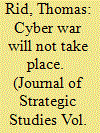

|
|
|
|
|
| Publication |
2012.
|
| Summary/Abstract |
For almost two decades, experts and defense establishments the world over have been predicting that cyber war is coming. But is it? This article argues in three steps that cyber war has never happened in the past, that cyber war does not take place in the present, and that it is unlikely that cyber war will occur in the future. It first outlines what would constitute cyber war: a potentially lethal, instrumental, and political act of force conducted through malicious code. The second part shows what cyber war is not, case-by-case. Not one single cyber offense on record constitutes an act of war on its own. The final part offers a more nuanced terminology to come to terms with cyber attacks. All politically motivated cyber attacks are merely sophisticated versions of three activities that are as old as warfare itself: sabotage, espionage, and subversion.
|
|
|
|
|
|
|
|
|
|
|
|
|
|
|
|
| 3 |
ID:
085156
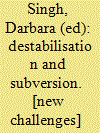

|
|
|
|
|
| Publication |
New Delhi, Patriot Publishers, 1987.
|
| Description |
71 p.
|
| Standard Number |
8170500583
|
|
|
|
|
|
|
|
|
|
|
|
Copies: C:1/I:0,R:0,Q:0
Circulation
| Accession# | Call# | Current Location | Status | Policy | Location |
| 027918 | 320.954/DAR;2 027918 | Main | On Shelf | General | |
|
|
|
|
| 4 |
ID:
164186


|
|
|
|
|
| Summary/Abstract |
E. Y. Harburg, the lyricist behind The Wizard of Oz, remains one of the most important songwriters blacklisted during the Cold War. His removal from Hollywood features in the 1950s denied moviegoers a distinct American voice whose lyrics mixed humor and entertainment to champion liberal causes. From 1944–1972, Director J. Edgar Hoover and the Bureau’s major field offices investigated Harburg. His declassified FBI file shows institutionalized incompetence in the way the Bureau went about writing reports, evaluating evidence, making conclusions, and conducting counter-intelligence work. Harburg’s story illuminates the battle between the left and right to shape popular culture during the Cold War. Hoover and Harburg held opposing views on politics, religion, economics, and race. Yet both men shared a fervent faith in popular culture’s capacity to transform America. Together they vied to remake the nation according to their own distinct visions – Hoover’s fear of declension stood in contrast to Harburg’s hope for radical progress.
|
|
|
|
|
|
|
|
|
|
|
|
|
|
|
|
| 5 |
ID:
189279
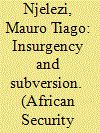

|
|
|
|
|
| Summary/Abstract |
Resulting from several social, political, economic and above all radical Islamic factors, the armed conflict in Cabo Delgado raised a variety of questions in the national and international system, among them the modus operandi of the group, now called Ahlu Sunnah Wa-Jammá. Thus, the present article analyses the way in which the modes of insurgency and subversion help to understand the modus operandi of the Ahlu Sunnah Wa-Jammá. For this purpose, a methodological study was established in which the semi-structured interview technique involved officers and documentary analysis for data collection. The results of the study show that the modus operandi of the Ahlu Sunnah Wa-Jammá is circumscribed to the organisation of numerous semi-autonomous cells which carry out guerrilla, terrorist and subversive actions. Furthermore, it was highlighted that the conflict was initiated by a minority of individuals subordinate to a radical religious ideology, and the objective of its operationalisation, until then, was carried out in three phases: preparatory, agitation and insurrection.
|
|
|
|
|
|
|
|
|
|
|
|
|
|
|
|
| 6 |
ID:
186905
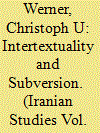

|
|
|
|
|
| Summary/Abstract |
This study proposes an innovative, triangular close reading of three Persian authors: Nezāmi, Golshiri, and Mandanipour. It argues that the two modern authors, Hushang Golshiri with his famous novella Shāh-e siyāhpushān, the “King of those clad in black,” and Shahriar Mandanipour in his Censoring an Iranian Love Story, are not only bound to each other in a close master-disciple relationship, but also consciously expound on the subversive potential of the twelfth-century poet Nezāmi. In the process, the divide between modern and classical narrative traditions in Persian literature is bound to disappear, allowing for novel interpretations and perspectives on Nezāmi and for his epics to be heard.
|
|
|
|
|
|
|
|
|
|
|
|
|
|
|
|
| 7 |
ID:
147713


|
|
|
|
|
| Summary/Abstract |
The rise of the Islamic State (ISIS/ISIL) is not well understood at this point. This paper starts by comparing the Islamic State to the Vietnamese communists in a revolutionary warfare framework and makes a causal argument that the Islamic State’s defeat of the Sahwa (Awakening) movement in Iraq was the key to its successful establishment of control of most Sunni areas and the mobilization of its population for support. Islamic State operational summaries and captured documents are used to quantitatively establish the impact of the subversion campaign against the Sahwa and Iraqi government and trace the efforts of operatives in tribal outreach and recruiting. This research provides a valuable insight into the return of a powerful method of insurgency as well as a glimpse into the vast clandestine network that provides the strength of the Islamic State movement.
|
|
|
|
|
|
|
|
|
|
|
|
|
|
|
|
| 8 |
ID:
111888
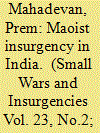

|
|
|
|
|
| Publication |
2012.
|
| Summary/Abstract |
Since 2004, the Indian government has described the country's Maoist insurgency as a grave threat to domestic security. A study of the sustaining dynamics behind Maoist violence suggests that the rebels are growing operationally stronger due to profits derived from organized crime. Having built up a parasitic economy that operates within the boundaries of nominal state control, they are proceeding to undermine that same control. In effect, the Maoists have assumed characteristics of a Mafia group. With India's economic growth having surged in recent years, their ability to finance aggressive operations and consolidate their subversive infrastructure has increased correspondingly.
|
|
|
|
|
|
|
|
|
|
|
|
|
|
|
|
| 9 |
ID:
153735
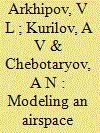

|
|
|
|
|
| Summary/Abstract |
This paper outlines new possibilities of using drones (UAVs) illicitly with regard to major state facilities (MSF) protected by Russia's National Guard troops and formulates a system of views on likely categories of potential trespassers, which can serve a basis for research into modeling an MSF airspace intruder.
|
|
|
|
|
|
|
|
|
|
|
|
|
|
|
|
| 10 |
ID:
124325
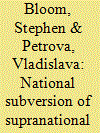

|
|
|
|
|
| Publication |
2013.
|
| Summary/Abstract |
The structural funds were designed to give the European Commission supranational control over where regional aid was spent. In this article, we argue that domestic 'pork-barrel' politics determine which regions are awarded regional aid in the new member states of Eastern Europe. Support for our argument comes from a dataset that includes 1,688 European Regional Development Fund grants to Latvia's 118 regions and 1,533 pre-accession Phare awards to Bulgaria's 264 municipalities. In both Bulgaria and Latvia, we find that regional aid projects went to wealthier not poorer localities, and to those that supported coalition parties in the previous election.
|
|
|
|
|
|
|
|
|
|
|
|
|
|
|
|
| 11 |
ID:
190774
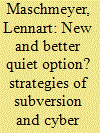

|
|
|
|
|
| Summary/Abstract |
Theorizing on cyber conflict has moved from warfare to conflict short of war, but strategic thought has not kept pace. This article argues cyber conflict is subversive, builds on intelligence scholarship to identify strategies of subversion, and examines their applicability in cyber conflict. It distinguishes three subversive strategies: manipulation, erosion and overthrow. The analysis shows cyber operations can only implement one of these strategies (erosion), indicating they offer less strategic value than traditional counterparts. Accordingly, although cyber operations offer superior scale, I argue their scope of influence is more limited. Finally, the article discusses strategic implications and identifies possible counterstrategies.
|
|
|
|
|
|
|
|
|
|
|
|
|
|
|
|
| 12 |
ID:
176023
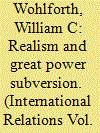

|
|
|
|
|
| Summary/Abstract |
I present a realist theory of subversion among great powers, an understudied phenomenon in the burgeoning literature on subversive statecraft. I show that a simple, rational cost-benefit calculus accounts for comparatively low-levels of subversion among non-belligerent great powers, much higher levels among belligerent great powers, and more frequent, violent and larger-scale subversion against weaker targets. Brief case studies of mid-twentieth century subversion featuring the Soviet Union and the United States illustrate the theory and provide preliminary support. Theory and evidence show that the conditions that are conducive to highly consequential subversion among great powers are quite limited and reversible. This gives rise to skepticism concerning claims that today’s strategic environment has fundamentally transformed the nature of great power rivalry so as to accord a newly central place to subversion.
|
|
|
|
|
|
|
|
|
|
|
|
|
|
|
|
| 13 |
ID:
169920
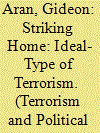

|
|
|
|
|
| Summary/Abstract |
This essay presents some preliminary notes in an anthropological perspective on terrorism. The following aims to be a questioning review of issues that haunt informed students of terrorism, and yet also an introductory text to the study of terrorism. It is revisionist but didactic. The essay is based on extended research of Palestinian and Israeli terrorism cases, and on critical integration of the literature on terrorism. It offers an alternative approach to the problem of the definition and distinct character of terrorism, expands on overlooked aspects of terrorism, like its relationship to the concept of “home,” emphasizes under-theorized subjects, like the randomness of the targets, and discusses hitherto untouched topics, like the “bad death” of terrorism’s victims. Terrorism is examined in terms of liminality and hybridity, and consequently as more subversive than coercive, threatening our ontological security no less than our physical security.
|
|
|
|
|
|
|
|
|
|
|
|
|
|
|
|
| 14 |
ID:
160996
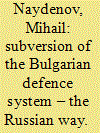

|
|
|
|
|
| Summary/Abstract |
Russia has long been pursuing an intended and calculated policy of keeping enough influence in Bulgaria in order to have control over national decisions. Together with the economic, energy, political and information tools used by Russia in its hybrid war against Bulgaria and in its bid to achieve an enduring “state capture,” defence is also a distinct target of Russian subversion now. A list of noticeable subversive actions with tangible effects can be summarised, ranging from fuelling division and manipulating public opinion, preventing the strengthening of the NATO position in the Black Sea, sabotaging defence reform to various options of subverting the modernisation of the Bulgarian Armed Forces and seeking new ways to keep legacy Soviet military equipment in operation as long as possible. This issue must be urgently addressed both nationally and in NATO.
|
|
|
|
|
|
|
|
|
|
|
|
|
|
|
|
| 15 |
ID:
167295
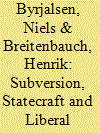

|
|
|
|
|
| Summary/Abstract |
Even if liberal democracies generally disfavour subversion, some kinds of subversive efforts may be necessary.
|
|
|
|
|
|
|
|
|
|
|
|
|
|
|
|
| 16 |
ID:
027256


|
|
|
|
|
| Publication |
London, WeidenFeld and Nicolson, 1985.
|
| Description |
xii, 404p.
|
| Standard Number |
0297787454
|
|
|
|
|
|
|
|
|
|
|
|
Copies: C:1/I:0,R:0,Q:0
Circulation
| Accession# | Call# | Current Location | Status | Policy | Location |
| 027124 | 327.12/LAQ 027124 | Main | On Shelf | General | |
|
|
|
|
|
|
|
|
|